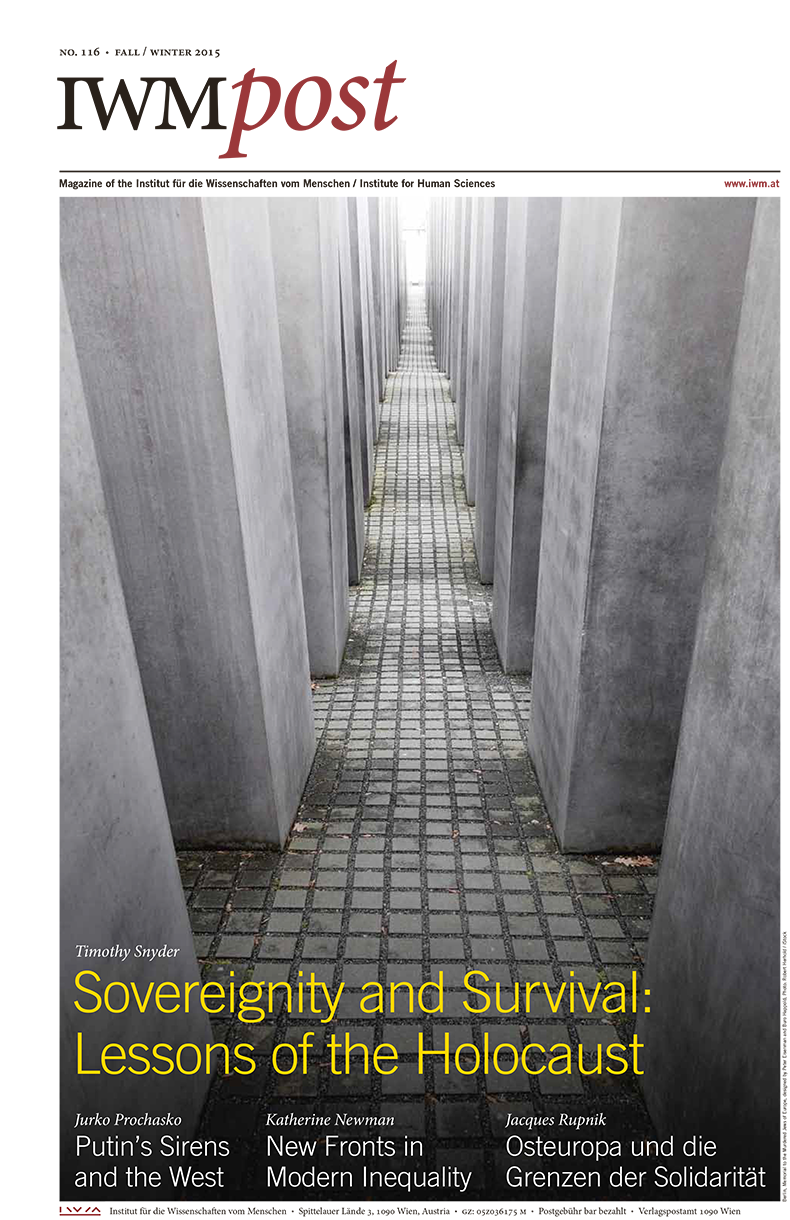This year’s Patočka Memorial Lecture, held by the Polish Soziologist Zygmunt Bauman in April 2015, was devoted to the subject of “Diasporic Terrorism”. Bauman addressed the challenges faced by multicultural societies, the ‘fear of the stranger’ and the ‘glocalization’ of conflicts. At that time nobody could anticipate the series of horrific attacks that would hit Paris only a few months later. From today’s perspective, Bauman’s appeal to engage in serious dialogue and to go beyond tolerance towards solidarity, seem more important than ever. That applies particularly to the current refugee crises in Europe which Jacques Rupnik analyzes from an Eastern European perspective. He tries to provide an answer to the question why the central and eastern European countries refuse to host larger numbers of refugees.
The issue of solidarity and growing inequality is also addressed by Katherine Newman und Ulrich Brinkman in their articles based on the 9th Solidarity conference. Another meeting on Hungary’s “System of National Cooperation” focused on that country’s troubled relationship with the EU. Kinga Göncz, Ulrike Lunacek and Jan-Werner Mueller discuss how an EU member state—once seen as a forerunner of democratization—has increasingly taken on authoritarian characteristics. Analyzing another regime using state power to suppress any opposition, Dmitry Dubrovsky reflects on the Kremlin’s battle against “undesirable” NGOs. Jurko Prochasko, in turn, critically examines the strong appeal ‘Putin’s sirens’ have to western audiences. Thomas Eder tackles another aspect of EU-Russia relations by asking if China will replace Europe as Russia’s main gas customer. Also in this issue, we report on two IWM projects: Ukraine in European Dialogue, a new program launched at the IWM, aims to support Ukrainian scholarship, quality journalism, and civil society through fellowships, events and publications. Launched in 2014, Between Bukharin and Balcerowicz, a multinational project aimed at preparing a comparative history of economic thought under communism presents its first results. Albena Shkodrova’s essay on the surreal power of the communist waiter illuminates the everyday consequences of such thinking. Last but not least, Timothy Snyder’s new book Black Earth finds parallels between the prehistory and preconditions of the Holocaust and current developments, such as Putin’s geopolitical ambitions, but also the future consequences of climate change. The chapter, presented in this issue, argues that there are very immediate and pressing lessons we need to learn from the past in order to avoid another holocaust.
Download the IWMpost 116 as a PDF
Contents
Books in Perspective
Sovereignity and Survival: Lessons of the Holocaust / by Timothy Snyder
Conferences
Budapest and Brussels: A Troubled Relationship / by János Mátyás Kovács and Balázs Trencsényi
Comments / by Kinga Göncz, Ulrike Lunacek and Jan-Werner Mueller
Von der Postdemokratie zur Postsolidarität / von Ulrich Brinkmann
New Fronts in Modern Inequality / Report by Katherine Newman
From the Fellows
Will China Replace Europe as Russia’s Main Gas Customer? / by Thomas S. Eder
The Surreal Power of the Communist Waiter / by Albena Shkodrova
Putin’s Sirens / by Jurko Prochasko
Foreign Agents and Undesirable Organizations / by Dmitry Dubrovsky
Refugees in Focus
Das andere Europa im Angesicht seiner Widersprüche / by Jacques Rupnik
Patočka Memorial Lecture
Zygmunt Bauman: Diasporic Terrorism / Report by Veronika Pehe
Events in Retrospect
Lectures and Debates
Fellows and Guests
Projects at the IWM
Fabricating a Perpetuum Mobile: Economic Thought under Communism Revisited / by János Mátyás Kovács
New Program: “Ukraine in European Dialogue” / by Timothy Snyder
News
Welcome to the IWM Boards
Publications / Varia
Books, Articles and Talks
Interview / Upcoming Events
